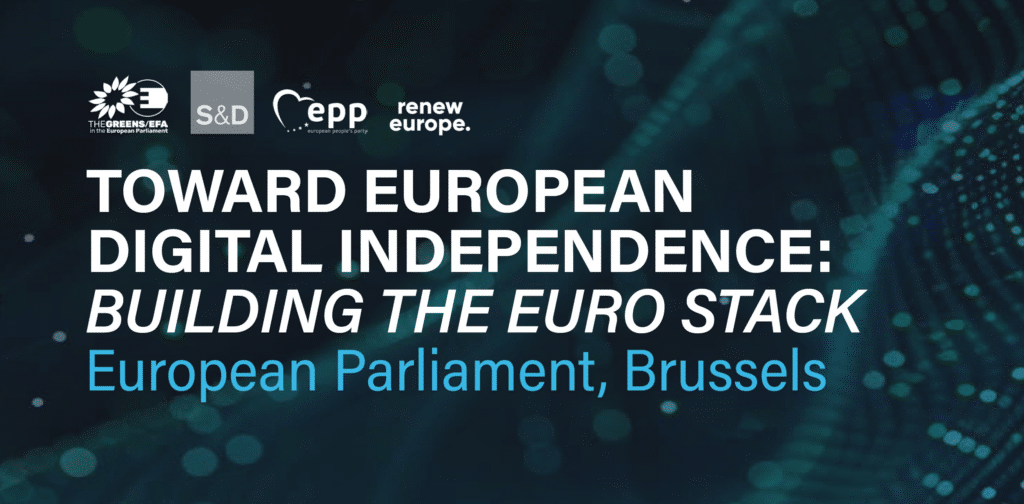On 24th September, the NGI Commons project was invited to participate in the ‘Toward European Digital Independence: Building the EuroStack’ event, where the focus was on Europe’s considerations to secure its own digital sovereignty. The event was organised and moderated by Cristina Caffarra and Francesca Bria, both members of the NGI Commons Strategic Advisory Panel (SAP). Two other members of the SAP, Marleen Stikker and Adriana Groh, were also among the speakers at the event.
The discussion broadly focused on the desire for European policymakers to build a EuroStack – European-led public digital infrastructure designed to safeguard independence across sectors such as healthcare, education, public services, but also industry.
In the first panel, speakers underlined the urgent need for a coherent and feasible plan that will give the right impetus and provide a solution to the outstanding digital infrastructures that must be publicly managed as common assets and be independent: the EuroStack integrating and building on top of the existing digital tools. The proposed initiative would aim to enhance Europe’s digital autonomy and provide more choice to European policymakers and those building the digital infrastructure itself, ensuring it serves the interests of its citizens while upholding EU values and safeguarding individual rights.
For NGI Commons, these discussions reinforced the importance of a democratically governed infrastructure to ensure that important values remain central to its technological future. In this respect, one of the main points raised at the event was Europe’s over-reliance on non-European technology suppliers. Speakers emphasised the need for investment, with the Draghi report highlighting €800 billion required for the development of a strong and competitive Europe. The question, however, is how much of that funding would go to the digital ecosystem, and what it would be directed towards. The potential of open source technologies was also a matter which was given some focus at the event. These technologies offer Europe the opportunity to build transparent and interoperable systems, critical for ensuring self-reliance. At the event, it was highlighted that open source solutions can empower local innovators to develop technologies that are both scalable and secure, helping to reduce Europe’s dependency on external platforms.
As Adriana Groh from the Sovereign Tech Fund put it:
“Simply throwing money at the issue won’t solve the problem unless we address the root causes. Open source is our most valuable tool; it’s often taken for granted and has been largely dominated by US companies. However, it represents an existing global digital commons. If we lose open source, the potential cost to replace the software infrastructure could reach trillions.”
The event also touched on the need for Europe to strengthen its cloud infrastructure. Recent service disruptions illustrated the vulnerabilities of relying on foreign providers, driving home the need for more European-owned cloud solutions to enhance security and autonomy. The conversation then focused on the importance of investing in key areas like AI and high-performance computing (HPC) to ensure that local talent remains within Europe and that the region maintains a competitive edge.
As highlighted by Thibaut Kleiner, the Director for Policy, Strategy and Outreach at DG Connect:
“We need to elevate our industry by not only defining the Eurostack but also leveraging our existing strengths. Europe has a solid foundation in high-performance computing (HPC), quantum technology, robust regulations, and a diverse array of telecom operators, connectivity providers, and operating system companies. While the Eurostack presents a winning formula, creating a cohesive ecosystem is a complex challenge that requires collaboration and strategic alignment among all stakeholders.”
Ultimately, the event highlighted that digital sovereignty is not just a technological challenge, but a societal and political imperative for Europe. Panellists expressed their belief that a cultural shift is needed, as it’s not yet common for governments to prioritise the concept of digital commons. A coalition of willing Member States, such as the EDIC on Digital Commons, might be essential for driving this change. Alexandra Geese, Member of the European Parliament, described this moment of 5 European parties represented at one event as a miracle. With the event taking place in the Parliament just days before the designated Commissioners’ hearings, speakers also expressed their appreciation for Finland’s Henna Virkkunen being appointed as the European Commission’s next Executive Vice-President for Tech Sovereignty, Security, and Democracy, signalling a significant shift in EU digital policy.
The final panel urged the European Commission to commit to this mission and collaborate with EU champions to tackle this challenge effectively. It’s crucial to think boldly and prioritise the adoption of these technologies. By working together, we can create a robust digital landscape that empowers all Member States and fosters innovation across the continent.
As a project committed to Europe’s digital sovereignty, NGI Commons continues to support the development of open source and interoperable technologies through the Digital Commons. We should prioritise building a cohesive digital environment instead of relying on separate operating systems and private tools. While different departments and countries may adopt unique solutions, we need to collectively share, fund, and support scalable digital commons.
Embracing a Digital Commons approach and commons-based sovereignty can empower communities, as they understand and regulate their own digital environments. This aligns with the original idea of the Internet while emphasising decentralisation and active participation, and it should be a part of whatever the focus of Europe’s EuroStack vision evolves into.

